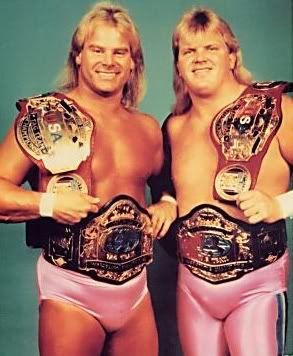
Some guys are just born 40 years old. If you've ever played pickup basketball or belonged to a gym, you know what I'm talking about. There's a guy who is balding, barrel-chested, and kinda hairy. He's got "old man strength" and can bench press way more than you'd think. On the court, he's the hack-box, the guy who roughs up anyone who drives the lane--the guy who who boxes out, has a tricky drop-step, etc. He never seems to get older, and you're pretty sure you can never picture him any younger than about 40 years old. As if he just fell out of the womb fully grown and already balding.
This is Arn Anderson. Also known as "The Enforcer," or "Double A." Like many NWA grapplers of the early to mid-'80s, he sported the full carpet of stomach hair that weaves its way indiscernibly up to his chest and slightly onto his shoulders. He had old man strength. His fundamentals were unparalleled. The guy did everything right, from armlocks to front-facelocks, to deep arm drags, to sunset flips, etc. His repertoire and determination were simply unmatched. And let's not forget his finisher, the spinebuster. An all-time great, criminally underrated coup de grace maneuver.
What really set Double A apart from his contemporaries was that, unlike most, I'm pretty sure Arn actually believed what he was doing was real. He lived his persona. He was, essentially, the personal bodyguard to Ric Flair [See Profile #1], and did all the dirty work for The Four Horsemen. He was there to break Dusty Rhodes' hand with a baseball bat while Big Dust was tied to a truck in Jim Crockett Promotions' parking lot. He was there to smash Ricky (or as Arn called him "Punky") Morton's nose on the concrete arena floor. And yes, he was there to stab Sid Vicious 40 times with a pair of scissors during a late-night drunken hotel brawl. In short, Double A was a bad motherfucker. For real. So it's easy to understand that he clearly couldn't separate ring-work from "real life." I mean, we're talking about a guy whose autobiography is written in "kayfabe," which is a wrestling industry term meaning "in character." Read that again: Arn wrote a book about his life in professional wrestling....as if the matches were 100% real. Fantastic.
Originally, Arn teamed with his on-screen "brother" Ole Anderson, and they formed one of the most menacing, brutal tag-teams in professional wrestling: The Minnesota Wrecking Crew. Their specialty comprised working on a single part of an opponent's body (usually an arm/shoulder) and systematically breaking that body part down during the course of a match until the opponent capitulated from the pain. Of course, today's wrestling fans are far too impatient to watch a sustained, methodical work.
Unfortunately, a compressed vertebrae that required surgery prematurely ended Double A's in-ring career. He left the sport as an ambassador of sorts for truly being a blue collar wrestler, in a sport made up almost entirely of those who fancy themselves blue collar. Arn was the real deal, though---a selfless, articulate guy who remains one of the more respected figures in an industry laden with duplicitous cheats.
Where is he now? Working for that pimp Vinc McMahon in a backstage/office capacity.







